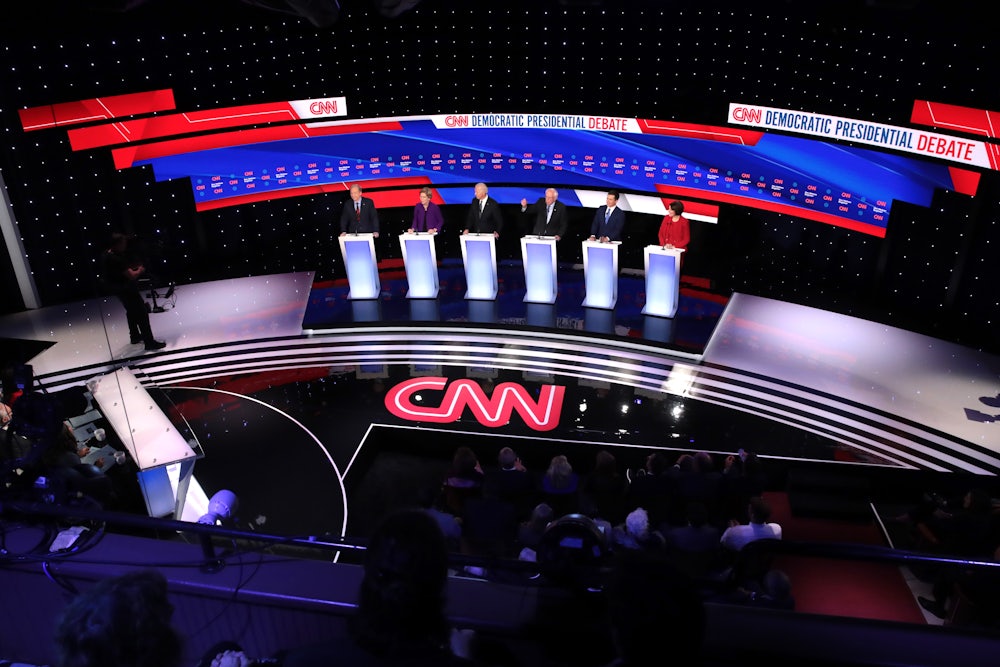The questions that have featured in this season of Democratic debates have alternated between infuriating and disappointing. Millions have watched as the media asks, on behalf of the American people, things that only people in the media think are important. No matter how the audience dwindles, or how loudly the Twitter touts denounce the proceedings, those in charge appear to be incapable of taking advice. There’s no incentive, it seems, to improve. The meritocracy has failed.
It is essentially a cliché now to point out that the turgid question, “How will you pay for it?” seems to only get applied to left-wing priorities—never to endless war, or to the cost of maintaining the status quo. But Tuesday night’s debate presented a particularly stark example. The affair began with repeated questions on Iran, including asking candidates point-blank if they would promise not to let Iran get a nuclear weapon. The question, which implied that a full range of force could and should be marshaled to prevent this outcome, was accompanied helpfully by a chyron asking if the candidates would promise Iran would never have a bomb, “as Trump did?” In a sensible world, someone in the Democratic Party might see that chyron and wonder why their candidates are being held to the standard of promising to be a Republican. They then might ask themselves whether these debates are doing a good job of helping Democrats pick the candidate they want.
Later in the debate, the now-inevitable (and inevitably redundant) health care segment replowed the ground already long since tilled: asking Bernie Sanders whether the country can afford Medicare for All, even asking if he “owes voters an explanation” for how he would fund it. No such inquiry was mounted over the cost of a limitless pledge to prevent Iran from developing a nuclear weapon; no mention of the higher cost of the health care status quo, except from Sanders himself. The same gestures toward your dad’s idea of Sensible Policymaking that routinely oozes out of the Beltway think-piece class and onto the pages of our finest newspapers was once again seamlessly shunted onto cable television.
If the unstated premise of every debate question is, “How can you assure us you will continue a sufficiently right-wing status quo?” it’s hard to see how things will ever change. The Democratic Party will never get the things it claims to want, let alone the things that it has ruled out as a matter of institutional timidity. Americans are correct to perceive that many of the people entrusted to run the country, and forge real improvements in their lives, take their cues from this pervasive line of thinking and adjust accordingly so as to maintain the idea that they are firmly within the acceptable, serious lane of mainstream thinking. There was a time this was called “manufacturing consent.”
CNN came terrifying close to redeeming itself when moderator Abby Phillip asked Pete Buttigieg about the “automatic enrollment” provision of his public option plan, which would entail sending people bills for their retroactive premiums—even if they didn’t know they were insured. This is a matter that has received little scrutiny. Buttigieg’s answer, however, was a nullity: “It’s making sure there’s no such thing as an uninsured American,” he replied. He then went on to praise the Obamacare individual mandate (to date, the only part of the Affordable Care Act with a negative approval rating), and finally pivoted to talking about the deficit. The moderators did not follow up, and Buttigieg skated by with a hollow response. Another opportunity to get some actual clarity on the public option—which is trotted out by politicians and media alike as the sensible middle ground—was squandered.
The Democratic National Committee spent an incredible amount of energy ensuring that the debates were fair to every weirdo who wanted to throw their hat in the ring. But it seems that almost no effort was made to ensure that the debate would be clarifying or responsive to the stated needs of American voters. If the Democratic Party thinks it is important for us to have 20 debates, for example, perhaps at least one or two could be hosted by a left-wing outlet not bent on assessing the relative conservatism of the liberal party’s candidates.
Perhaps it would be good for the diversity of thought, let alone the actual progress of Democratic priorities, to have some questions that don’t sound like they were written by an AI algorithm that was fed a decade’s worth of Jennifer Rubin columns. This could mean extending the privilege of hosting debates to a more diverse range of outlets, having more single-topic debates, or creating a more transparent and inclusive process for picking the questions. At the very least, it might mean reconsidering whether CNN is up to the task of participating in this process. These are steps that Democrats might want to take the next time around, assuming there is a next time. After all, no one was able to promise that a nuclear stockpile wouldn’t end up in the hands of Donald Trump.
